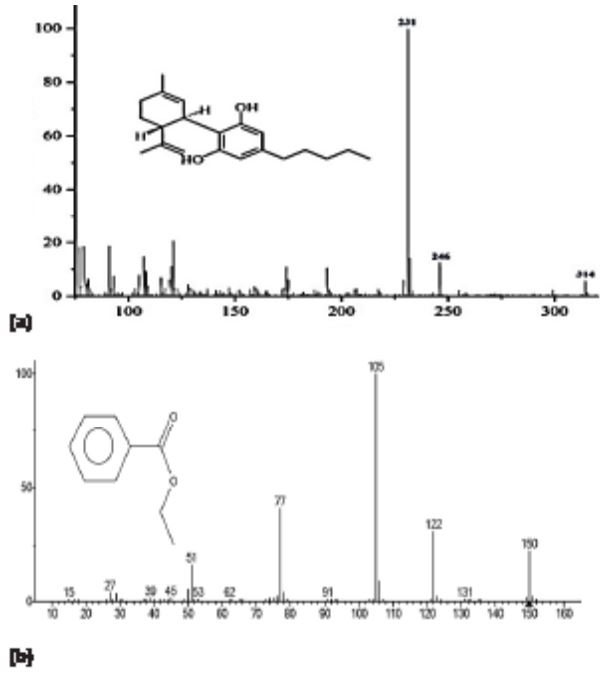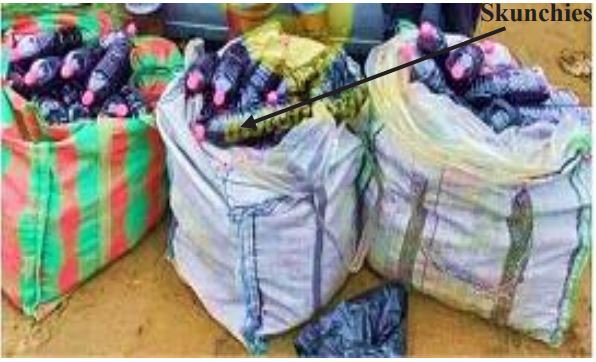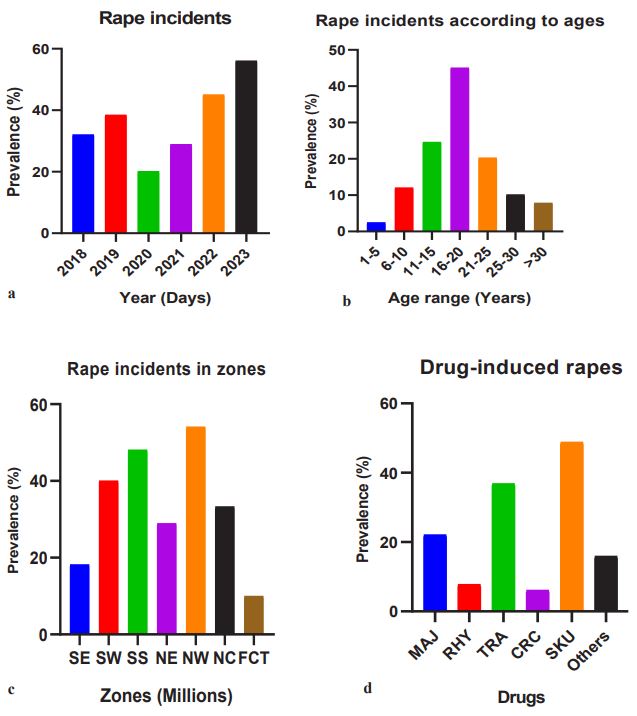
SciBase Journals
SciBase Clinical and Medical Case Reports
ISSN 2995-5874
- Article Type: Case Report
- Volume 2, Issue 1
- Received: Feb 05, 2024
- Accepted: Mar 21, 2024
- Published Online: Mar 28, 2024
The Increasing Incidence of Rapes Caused by Illicit Use of Skunchies and Rohypnol Among Youths in Nigeria
Cletus Anes Ukwubile1*; Livinus Tam2
1Department of Pharmacognosy, Faculty of Pharmacy, University of Maiduguri, Nigeria.
2Sancta Maria Health Clinic, Diagnostic Laboratory, Bali, Nigeria.
*Corresponding Author: Cletus Anes Ukwubile
Department of Pharmacognosy, Faculty of Pharmacy, University of Maiduguri, Nigeria.
Email: doccletus@yahoo.com
Abstract
The ugly rise in rape cases in Nigeria caused by persistent use of stimulants commonly referred to as ‘skunchies and Rohypnol posed a great challenge for health professionals and drug regulatory authorities. We report two cases of illicit use of controlled or banned substances in the preparation of ‘zobo’ artisanal beverages in some parts of Nigeria and consumed by some youths to be ‘high’. In this case, dried or fresh leaves of marijuana (Cannabis sativa) are soaked in water for 48 hours, and the resulting filtrate will be mixed with cracked cocaine and ethanol. This mixture will then be added to prepared artisanal ‘zobo’ (Hibiscus sabdariffa) beverages and sold to some youths for consumption to be ‘high’. In case two, instead of adding the abovementioned substances to the ‘zobo’ beverages, Rohypnol (Flunitrazepam) a CNS depressant was added. The consequences of using these two preparations by some youths aged between 18 and 40 years are elevated rape cases in Nigeria (with many rape cases unreported). Most of the consumers of these preparations are currently in rehabilitation health centres across the country due to various degrees of CNS imbalance.
Keywords: Skunchies; Zobo beverages; Marijuana; Cracked cocaine; Rohypnol.
Citation: Ukwubile CA, Tam L. The Increasing Incidence of Rapes Caused by Illicit Use of Skunchies and Rohypnol Among Youths in Nigeria. SciBase Clin Med Case Rep. 2024; 2(1): 1019.
Introduction
Medically, rape is defined as illegal sexual intercourse forcefully carried out (without the victim’s consent) usually with threat or medically induced with psychoactive substances or drugs to a person mostly females of any age by the opposite sex usually males [1]. This ugly situation occurs worldwide and has lasting effects on the victims such as cultural, social, psychological and clinical. Recently, there are an alarming increase in rape cases in both rural and urban areas. The majority of rape cases in rural and urban areas are seldom reported for fear of stigmatization. In most cases, children between the ages of 3 and 10 years fall victim in some African countries [1]. A report by the United Nations Women in 2020 showed that out of 11,200 reported rape cases in Nigeria, 5% resulted in deaths children inclusive. It was reported that in every 100,000 females, 1,300 are raped annually in rural communities in Nigeria. The incidence of rapes has been on the increase in all zones in Nigeria, although reports had shown that rape cases are prevalent in some zones [2]. Most rape cases are driven by the consumption of certain stimulants such as ‘skunchies’ and Rohypnol. A report by the National Drug Law Enforcement Agency (NDLEA) released by the National Bureau of Statistics (NBS) clearly showed that drug-related crimes are prevalent in some states in northern Nigeria, and the use of these concoctions is also increasing in northern Nigeria and few southwest Nigeria states [2]. The use of marijuana (Cannabis sativa) in ‘zobo’ beverages by dubious ‘zobo sellers’ is now very common. For rape to occur in most cases, the perpetrators must be ‘high” (a situation of being induced by psychoactive substances). About 65% rape cases in Nigeria are drug-induced especially from the consumption of adulterated artisanal beverages such as zobo, kunun-aya, and kunun-zaki mostly found in northern Nigeria [3]. The use of these substances in these beverages has significant side effects to their users aside from the conceived rape ideas. For instance, the effects of using marijuana crack cocaine and Rohypnol have been extensively documented in pharmacological texts and other books of authorities, hence, the reasons for their restrictions in Nigeria and other parts of the world. The ugly rising trend in substance-induced rape cases in Nigeria prompted this current report for immediate action by concerned authorities.
Case presentation
Three females of ages 10, 18 and 24 years with blood stains and bruises on their bodies respectively narrated their stories separately on how each was raped in November and December 2023 in certain states in Nigeria. According to two of the victims, the perpetrators (the rapists) were consuming ‘zobo’ drinks after which they forced themselves on them (rape victims). The third female was offered some glass (cup) of zobo beverages to consume, and after drinking the zobo, she fell off only to see herself stained in blood. Together with some local security personnel, we were taken to the houses where these incidents occurred after much persuasion to the victims. Luckily for us, we collected the samples of the ‘zobo’ (skunchies) for laboratory analysis to ascertain the compositions while the victims were referred to hospitals for proper checks and treatments. The collected samples of ‘zobo’ were analyzed using chromatographic techniques (Gas Chromatography-Mass Spectrometry; GC-MS and High-Performance Liquid Chromatography; HPLC), qualitative and quantitative chemical analysis following standard procedures to detect the presence and amount of some suspected substances.
Results
The results of our analysis showed that the zobo drink in addition to anthocyanins contains cannabidiol, cannabidiol acid and delta-9-tetrahydrocannabinol (∆9 -THCA; Molecular formula: C21H30O2 ) which are psychoactive compounds from cannabis sativa.
Table 1: Quantitative phytochemical and chemical contents of ‘skunchies’ (adulterated zobo)
| Constituents | Quantity (%) |
|---|---|
| Cannabinoids | 2.08 |
| Terpenoids | 0.26 |
| Flavonoids | 0.38 |
| 1,4-benzodiazepinone | 1.66* |
| • From flunitrazepam mixed with zobo drink |
Discussion
Drug-induced rape cases are the current trend in many states in Nigeria facilitated by the use of intentionally adulterated ‘zobo’ beverages with psychoactive substances (Figures 1a and b; Figure 2). Despite this ugly development, many rape cases remained unreported for the fear of victimization by the rapists and stigmatization by the society due to religious or cultural beliefs. Our recent case report has shown most rapists are induced into the act by two popular psychoactive substances often referred to as ‘skunchies’ and Rohypnol (a CNS depressant). Because of the strict regulations put in place by the National Drug Law Enforcement Agency (NDLEA) in Nigeria, the use of these substances alone is very difficult for their users. To overcome this, some unlawful sellers have resulted in mixing marijuana, crack cocaine and ethanol in ‘zobo’ drinks, and sold the same to the youths who have nicked-named this preparation as ‘skunchies’. In recent times, the Nigerian Police has apprehended the sellers of this preparations for prosecution in Court. Despite the unrelenting efforts by the NDLEA and the Nigerian Police as well as the intense campaign by the National Agency for Food Drug Administration and Control (NAFDAC) against the use of these highly prohibited substances, their uses are still the increase with more increase in 2023 accounting for 59.9 % (Figure 3a). The prevalence of drug-induced rape cases can now be seen in schools, worship places, roads, offices, farms, and homes [1]. From the reported cases, the perpetrators of these heinous crimes did not act in their normal senses but rather induced mainly by ‘skunchies’ (Figure 3b). Most drug-induced rape victims in Nigeria are between the ages of 16-20 years (Figure 3b). The incidences of drug-induced rapes by men on ages 1-30 years are more prevalent in the North-West (NW) and South-South (SS) Nigeria (Figure 3c). A similar report on drugrelated crimes among the youths in northern Nigeria has also been published [5]. Similarly, the use of ‘skunchies’ (a.k.a. King of Highness) accounts for 51.5 % of cases of drug-induced rapes in Nigeria. Our report showed that ‘zobo’ drinks specially prepared as ‘skunchies’ are sold at higher prices to the youths who need them. The use of these substances by youths apart from rapes has resulted in various types of drug-related crimes as has been reported by the NDLEA [2]. Finally, all parents must join hands with relevant agencies of the government to prevent this rapid rise in drug-induced cases in Nigeria. On the other hand, rape victims should summon courage as was done in the two cases to report rape incidence to seek proper medical attention as well bring the perpetrators to questioning and possible prosecution. Unless the authorities checkmate the activities of these artisanal beverage sellers in Nigeria, the fight against drug-induced rapes and other crimes will be a long one.
Conclusion
The present case report identified that some of our local beverages such as zobo, kunun-aya, kunun-zaki, etc. may not be what the sellers claimed it was but a mixture of various prohibited substances that are capable of promoting rapes and other crimes in the country. Therefore, the relevant drug regulating and control agencies in Nigeria must look towards this direction as well for a safer country free from drug-related rape cases.
Declarations: The authors declare that they have no conflict of interest.
Declarations
Conflict of interest: We have none to declare.
Funding: We received no funding.
Ethical approval: No ethical approval was required. However, the consents of the victims were sought on anonymous condition to publish this case report.
Author contributions: All authors contributed equally to the report.
Informed consent: The victims agreed on an anonymous condition for this report.
Acknowledgement: We are grateful to the National Bureau of Statistics and the National Drug Law Enforcement Agency for using some information from their websites.
References
- Idoko CA, Nwobodo E, Idoko CI. Trends in rape cases in a Nigerian state. Afr Health Sci. 2020; 20(2): 668-75.
- National Bureau Of Statistics Drug Related Crime Statistics (2010 - 2014) Source: National Drug Law Enforcement Agency (NDLEA) TABLE 1. 2014.
- Nwaiwu O, Aduba CC, Igbokwe VC, Sam CE, Ukwuru MU. Traditional and artisanal beverages in Nigeria: Microbial diversity and safety issues. Beverages. 2020; 6(3): 1-22.
- Lynch HN, Authement CC, Maczko A, Parker M, Beaty K, Liyana Pathiranage A. Gas Chromatography-Mass Spectrometry Analysis of Cannabis: Undergraduate Organic Chemistry Laboratory Exercise. J Chem Educ. 2023; 100(3): 1303-12.
- Mukhtar JI. Drug-Crime Nexus Among Nigerian Youths: A Solution Through. ResearchgateNet. 2019.



